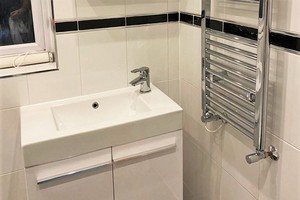
You may notice that the heating in your home is not as effective as usual, and some rooms are colder than others. If this is the case, you should check the radiators in your home to see if they are heating up properly. If they feel cold at the top and warm at the bottom, this is an indicator that they need bleeding. You shouldn’t be worried, as this is something that you can resolve yourself with no problems, you will simply need to follow the following steps…
How to bleed your radiator
Before you get started, you should ensure that your central heating system is turned off and all radiators are cold. We recommend starting with downstairs radiators first, or the one furthest from your boiler.
- Hold a jug underneath the bleed valve to catch any water, then insert the radiator bleed key.
- Turn the key anti-clockwise to open the valve. As you turn it you should hear a hissing sound, don’t be concerned, this is just the trapped air escaping from the radiator.
- Once the hissing noise has stopped, turn the key clockwise to close the valve back up if any water starts escaping.
- Repeat this same process on all other radiator valves in your home until you have worked your way to the radiator closest to the boiler.
- Once complete, turn your heating back on and check to see if there are still any cold spots noticeable on your radiators. Your heating should now be working efficiently once again.
- Bleeding your radiators can cause your boiler pressure to be lowered, so you should check if your central heating needs to be repressurised. You can do this by adjusting the filling loop.
How often should you bleed your radiator?
You should aim to bleed your radiators once a year so that you can be sure that there are no issues with your heating. The best time to do this would be just before winter so that you do not encounter heating and hot water problems in the coldest months of the year. If you are noticing persistent radiator problems and cold patches, you should call a plumber to resolve this.
What are the benefits of bleeding your radiator?
Not only does bleeding your radiators make them heat more effectively and keep your home warmer, but it can also save you money on your heating bills. This is because your radiators will be heated quickly and more efficiently by your boiler, leading to less energy being consumed. There is also less build up of pressure in your boiler as you will not need to turn the heating up as much to heat your home.
If you are not confident bleeding your radiators yourself, or this process has not fixed the problems you are having with your central heating, it is time to call in the experts. Here at Platinum Plumbers, our fully qualified team are perfect for any plumbing or heating job. Whether its radiator problems or boiler breakdowns, we can get to the bottom of this so that your home is back to normal as soon as possible. To get booked in with us, call 020 8855 0361 or email and we would be happy to help.

